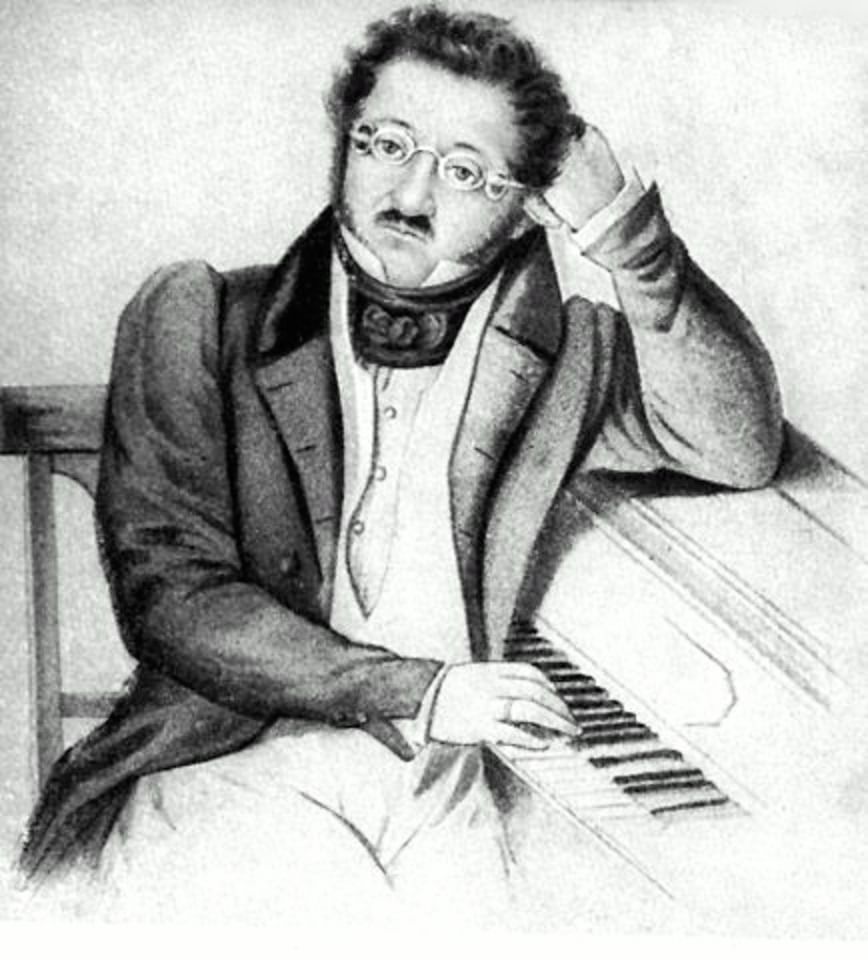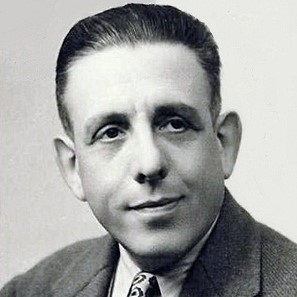 |
| Alexander Aliabiev |
The performance is by Mantanus-Quintett from their album Russian Music for Brass Quintet.
Information about Aliabiev from Musicalion.com:
Alexander Alexandrovich Alyabyev (1787-1851) was a Russian composer. He was a very successful composer in 19th century Russia, writing some 200 romances, 7 operas, 20 musical comedies, and many choral, symphonic, chamber and piano works. Now, if he is remembered at all, it is for his romance "The Nightingale".
A participant in the Patriotic War of 1812, he was an officer until 1823. He was an author of vaudevilles, including Morning and Evening, and operas, including Moonlight night, or The House-Spirit, first staged in 1823) and wrote choruses to a prologue Celebration of muses to open the Bolshoi Theatre (1825). In 1827 he composed a ballet Magic drum, or the Consequence of the Magic flute. His compositions also include chamber music, including two string quartets (and one further, unfinished). The overture to Morning and Evening, and some of his chamber works, have recently been recorded.
He was born into a wealthy family and began his musical education while young. In 1812 he joined the Russian army to fight against the forces of Napoleon. A keen soldier, he was given two awards for courage. He left the army in 1824 and took residence in Moscow. By 1825 he had been imprisoned in connection with the death of a man after a night of gambling. Around this time he composed his most famous piece "The Nightingale", a setting of a poem of the same name by a friend of Pushkin's. This work was immensely popular and was used by both Liszt and Glinka as a theme for piano variations. In 1728 he was exiled to Siberia and in 1843 was allowed to return to Moscow having been acquitted of the murder. He continued to compose until his death in 1851.
In 1825 he was arrested on false charges of murder, and was banished to Siberia in 1828. He moved to the Caucasus and later to the Southern Ural Mountains. From the end of the 1830s, he lived in Moscow.
From BBC (for alternate spellings and renderings):
Alexander Aleksandrovich Alyabyev (Russian: Алекса́ндр Алекса́ндрович Аля́бьев; 15 August [O.S. 4 August] 1787 – 6 March [O.S. 22 February] 1851), also rendered as Alabiev or Alabieff, was a Russian composer known as one of the fathers of the Russian art song. He wrote seven operas, twenty musical comedies, a symphony, three string quartets, more than 200 songs, and many other pieces.
The Russian spelling lead me to this website which Google translate converted to:
Alyabyev was born on August 15, 1787 in Tobolsk in the family of a civil governor. The Alyabyevs' house was musical, both parents and guests played exiles, who were patronized by the father of the future composer. In 1796 the family moved to St. Petersburg , where his father received a position in the Berg College - the Mining Department, and Alexander Alyabyev took music lessons from Johann Heinrich Miller. A few years later he moved to Moscow , where he entered a boarding school at Moscow University and began to study the basics of composition. After the nominal service, to which he, as a "young man of the nobles," was enlisted as early as 14 years old, Alexander Alyabyev began to enter the actual service. He combined work in the Moscow Berg office with music classes. In 1810, the first works of Alyabyev were published - romance and waltzes. When the Patriotic War began, Alexander Alyabyev was enlisted in the Cossack regiment and sent to Ukraine. He met Denis Davydov and enrolled in his partisan detachment, and after that he was sent to the Irkutsk hussar regiment, which was then in the Belarusian Kobrin. There he made friends with Alexander Griboedov and Nikolai Tolstoy - the father of Leo Tolstoy . In military service, Alexander Alyabyev received two orders of St. Anna of the third degree, the Order of St. Vladimir of the fourth degree, the medal "In memory of the Patriotic War of 1812." Relatives noted that he is “a reckless and brave officer . ” The service continued after the victory over Napoleon. In his free time, Alyabyev composed a string quartet, a piano trio and a quintet, many romances, among which there was an elegy to Pushkin ’s poems “The Daylight Has Faded”. On February 12, 1822, the Bolshoi Theater of St. Petersburg hosted the premiere of vaudeville by Nikolai Khmelnitsky with the music of Alyabyev, Ludwig Wilhelm Maurer and Alexei Verstovsky "New Prank, or Theater Battle." Alyabyev made his debut as a theater composer. In January 1823, the opera vaudeville "The Village Philosopher" was staged at the Mokhovaya Theater, and in June, with a week difference, the premiere of Alyabyev's opera "Moonlit Night, or Brownies" was a great success. Vladimir Odoevsky later wrote: “Alyabyev’s operas are no worse than French comic operas . ”
The composer, meanwhile, became increasingly burdened by military service. He submitted a letter of resignation, and at the end of 1823 an order was issued for his dismissal. Alyabyev settled in Moscow. He participated in musical evenings that took place in the house of Maria Ivanovna Rimsky-Korsakova. Later, her youngest daughter Catherine became the wife of the composer.
In 1825, Alyabyev’s music was performed at the Moscow Bolshoi Theater. To open the new theater building, Mikhail Dmitriev wrote a poetic prologue, "The Triumph of Muses." The music for it was created by Friedrich (Fedor) Scholz, Alexey Verstovsky and Alexander Alyabyev.
However, in the life of Alyabyev there were not only musical evenings and theatrical premieres, but also gambling. In February 1825, the composer was arrested: cards were played in his house, a quarrel occurred. One of the participants in the conflict three days later died from an apoplexy strike. And one of the witnesses told the police that the victim was hit by Alexander Alyabyev. There was no other evidence or such evidence, but the composer ended up in a prison cell. Even there, he continued to write music that sounded on theater stages.
While the trial dragged on, Alyabyev composed several opera-vaudeville, the song “The Nightingale”, a vocal miniature based on poems by Anton Delvig. On December 1, 1827, the State Council passed a guilty verdict: Alexander Alyabyev was deprived of his noble rank, awards, and exiled to Siberia. In February, he arrived in Tobolsk and came under the supervision of the Governor of Western Siberia, Ivan Velyaminov. Velyaminov allowed the composer to make music. In the same year, an orchestra of "Cossack music" was transferred to Tobolsk from Omsk . Alyabyev took him under his care. They rehearsed a lot, and the collective became a full-fledged symphony orchestra, which played at balls and gave concerts.
Thanks to the efforts of Velyaminov and relatives in 1832, Alyabyev managed to leave for the Caucasus - to treat his eyes. Of course, there he was also under "strict supervision." Alyabyev became interested in Caucasian folklore. The composer composed romances inspired by Kabardian, Circassian, Georgian melodies. They entered the collection "Caucasian singer." Then Alyabyev began working on music for the Caucasian novel Bestuzhev-Marlinsky "Ammalat-bek." Later this work became the basis for the opera of the same name.
In 1833, the composer was allowed to settle in Orenburg , where he fell under the wing of Governor General Vasily Perovsky, a participant in the Patriotic War, a connoisseur of art. At the risk of his own career, Perovsky sought permission for him to live in the Moscow province, in the estate of his relatives.
Alexander Alyabyev still composed a lot. In 1838 he wrote music for Pushkin's “The Mermaid” - this work was inspired by impressions of the death of the poet. The performance was presented on the stage of the Moscow Bolshoi Theater. Instead of the name of the composer, only the initials were indicated on the playbill of the performance - “A. A.".
In 1843, after countless petitions, Alyabyev was finally allowed to live in Moscow. The noble title was not returned to him. In Moscow, the composer became a regular participant in "Thursdays" in the house of Alexander Veltman, a linguist, poet, and archaeologist. Famous writers, musicians and scholars gathered at these evenings. Alyabyev devoted much time to choral work: he wrote and prepared for the publication “A Collection of Different Russian Songs” for the choir. It included miniatures on verses by Alexander Pushkin, Anton Delvig, Vasily Zhukovsky , Nikolai Karamzin and other poets. However, the collection was published only in 1952.
Alexander Alyabyev died in 1851. He was buried in the family tomb in Simon Monastery. However, during the years of Soviet rule, the monastery was destroyed - and with it the graves of the composer and his relatives were destroyed.
I finally found the publication date of his brass quintet (1847) at this Allmusic link.
 |
| Francis Poulenc |
performed by Guy Touvron on trumpet, Hervé Joulain on horn, and Jacques Mauger on trombone. It is a witty and, at times, poignant work and one of the most significant brass trios from the 20th century. Most notably in the score are numerous disparities in articulation and dynamics between the three instruments. In this excerpt from a thesis by John T. Cord, Francis Poulenc’s Sonata for Horn, Trumpet and Trombone: A Structural Analysis Identifying Historical Significance, Form and Implications for Performance, he explains the significance of the work.
The Sonata is a work of singular importance in the development of modern brass chamber music, requiring considerable musical understanding and highly developed performance skills on the part of the players. An understanding of French style is assumed for an accurate performance, but Poulenc‟s extreme approach to issues of tempo, counterpoint, balance, intonation, and expression must also be addressed.
In addition to a basic understanding of French style, the performers must also understand Poulenc's intentions. His approach to using “added-notes” and dissonances, as has been discussed, is an essential feature in this and other compositions of his early period. When performing these dissonances, no apologies can be made in their presentation as they must be played with conviction and strength so that listeners will be acutely aware of the exact effects.
The three movements complement each other in several ways, bringing together the best desired qualities of Poulenc's dry, witty style and the lyricism which is integral in his vocal works. Poulenc seems to alternate between joyful, tongue-in-cheek moods and serious moments full of reflection in time frames often only seconds apart. However, the overriding mood of the Sonata has to be in the realm of fun and folly. Poulenc is meticulous in every detail in his indications to the performers. In order for his wit and unique brand of humor to be fully appreciated, these indications must be followed faithfully.

No comments:
Post a Comment